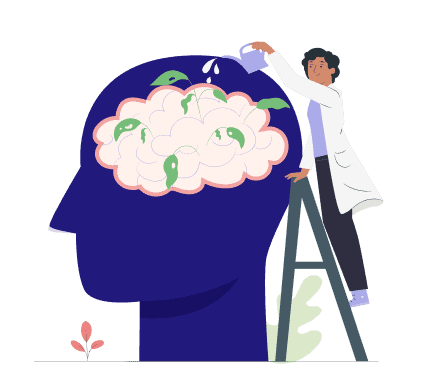The Science
The Science of Well-Being
The Science of Well-Being

Emotewell provides journaling exercises that are backed by positive psychology research. Rather than focusing on how negative thoughts, feelings, and behaviors can lead to anxiety and depression, positive psychology research focuses on how positive thoughts, feelings, and behaviors can improve people’s well-being.
According to Martin Seligman, a founder of the field, it is the study of what makes life worth living (Seligman & Csikszentmihalyi, 2000). The focus on well-being stems from the idea that the absence of bad things doesn’t make someone happy. In order to understand what makes people happy, we need to study what happens when things go well in people’s lives. Central in positive psychology is the power of cultivating positive emotions, like gratitude, compassion, and joy.
Based on The Latest Research from

Positive Psychology
Positive psychology is a growing field of research dedicated to increasing well-being through science

Top Universities
Our exercises are based on research from scientific journals and leading universities such as UC Berkeley, Northwestern, and more

The Gottman Institute
John Gottman leads research on love and relationships and is widely known in the scientific community as the “Love Doctor”
Emotewell guides you through the following exercises backed by research.
Each one of our exercises is carefully curated and backed by rigorous scientific research. Our platform suggests which ones work well for you depending on your need. Learn more about the research behind each of our specific journaling prompts by following the scientific research links below:
- Gratitude journal: Writing in a gratitude journal or just thinking about what you are grateful for can make you feel happier and more connected with friends and family (Emmons & Stern, 2013).
- Expressive writing: Writing about painful experiences can help you process your emotions and improve your relationships (Gortner, Rude & Pennebaker, 2006; Slatcher & Pennebaker, 2006).
- Self-compassionate letter: Treating yourself in a kind and empathic way, the way you would treat a friend, is linked with better well-being (Barnard & Curry, 2011).
- Self-distancing: Viewing a negative emotional event as if you were a fly on the wall has been found to enhance peoples’ ability to engage in adaptive self-reflection (Kross & Ayduk, 2016).
- Value affirmation: Writing about your core values can strengthen your ability to withstand stressful events and, in so doing, improve your health and relationships (Cohen & Sherman, 2014).
- Best possible self: Imagining yourself in the best possible future has been shown to increase positive emotions and optimism, and decrease negative emotions (Carrillo et al., 2019).
- Softened startup: Being open-minded, accepting, and open to influence with your partner is crucial for maintaining satisfying relationships (Gottman & Gottman, 2008).
- Cherishing your partner: Showing gratitude to your partner in ways that detail what you appreciate about them is related to better interactions with your partner and greater satisfaction (Algoe, Kurtz, & Hilaire, 2016).
- Gain perspective: Taking a third-person perspective to relationship conflicts can help reduce feelings of distress and preserve relationship satisfaction (Finkel et al., 2013).
Start Your Wellness Journey Today
